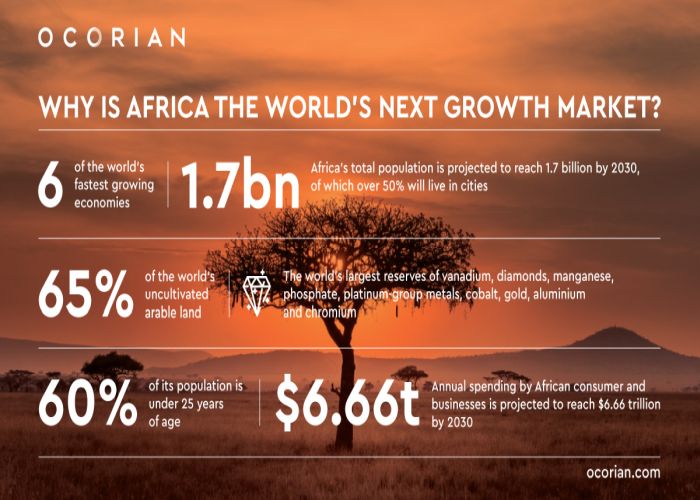- with readers working within the Securities & Investment industries
With sub-Saharan Africa (SSA) emerging as one of the world's fastest growing regions, Managing Director of our UAE office, Nina Auchoybur highlights why many Gulf Cooperation Council (GCC) investors are now looking further south to capitalise on the continent's opportunities.
Traditionally, GCC investors have had a long and fruitful economic partnership with North Africa owing to shared cultural ties and proximity. However, they are now increasingly looking further south to SSA as it emerges as one of the world's fastest growing regions - four of the fastest growing economies in the world are Cote d'Ivoire, Ethiopia, Ghana, and Rwanda.

Investors are now finding confidence in the long-term attractiveness of returns in Africa compared to those of more developed markets. As a result, there is now a renewed 'scramble for Africa' and GCC members face strong investor competition from the historic colonial nations, as well as from the world's newer economic powerhouses such as China. Despite this competition, GCC investors may have an advantage difficult to match...
Expertise across many of Africa's booming industries
Dubbed by many as the world's next big growth market, Africa is brimming with opportunity across a number of sectors including real estate, infrastructure, hospitality and construction. Facing an estimated shortfall of 51 million housing units, there has been an influx of foreign direct investment over the past two years, particularly in SSA. Long attracted to these sectors owing to their experience in the UAE real estate markets, the opportunities in SSA make commercial sense for GCC investors and provide them with a chance to diversify their portfolios.
As SSA's population rapidly urbanises, investors are also turning towards the development of infrastructure. The infrastructure financing gap in SSA is estimated at some $170bn annually1, creating a substantive opportunity for infrastructure funds support. Within that sector, SSA is experiencing its first ever public-private partnerships, with interest both from general partners and limited partners growing steadily in recent years.
In support of the growing industrialisation of the continent, the renewable energy sector is also a key growth area. Both infrastructure and energy can catalyse African economies, giving investors the capacity to leave an indelible imprint on the recipient economy.
With an unbanked population of about 60% and mobile penetration rate of 44%, SSA's FinTech sector is also peaking investor interests on the continent, namely in the three main hubs of South Africa, Kenya and Nigeria. Tech-enabling solutions in the consumer-discretionary space are also trends for the future, together with the diverse potential of applications in agribusiness.
Well-positioned for multi-country investment strategies
Approximately three out of four African citizens now live in a country where public governance has improved over the past years2. This is supported by the rise of several African nations in the World Bank's 2020 ease of business rankings, giving investors and consortiums much more confidence in their investment's potential performance.
Investments spread over a number of countries reduce political risk but also contribute to building experience, local knowledge and economies of scale. By virtue of its geographical, cultural and historic links with Africa, it may be easier for a GCC investor to develop a multi-country investment strategy for Africa than for an investor from elsewhere. Countries such as South Africa ($5.3bn), the Democratic Republic of the Congo ($4.3bn) and Ethiopia ($3.3bn)3 topped the list of SSA's FDI recipients in 2018, but countries such as Mozambique and Rwanda amongst others, are also turning investor heads4.
The rise of African private equity
As an indication of investors' confidence in the long-term attractiveness of Africa, private equity (PE) activity has steadily increased on the continent with a total value of $17.8bn being raised between 2013-185. Deal volumes also rose from 171 in 2017 to 186 in 2018, with information technology, consumer discretionary and consumer staples accounting for almost one in every two deals. Unsurprisingly, communication services was the largest sector by value and Nigeria, Kenya and South Africa attracted the largest share of PE activity 6.
This rise of African PE fundraising is expected to continue too, giving GCC investors ample opportunity to spread their investments across sectors and geographies; a African Private Equity and Venture Capital Association survey revealed that 76% of surveyed investors are planning to increase or maintain their allocations to PE over the next three years.
The future for the GCC investor in Africa
For private equity and other forms of private investment coming from the GCC into SSA, the outlook for the coming years is promising, particularly considering the impending rollout of the African Continental Free Trade Area - the world's largest free trade area. Add to this rising governance levels, strengthening business infrastructure and opportunities across a number of rapidly evolving sectors, and SSA is becoming an attractive investment destination for investors seeking to diversify portfolios and access sectors with room for significant growth. However, for long-term success, the GCC and SSA must maintain a sustainable investment equilibrium that works for both parties.
Structuring investments for the best chance of success
By providing value-adding investment structuring and administration services from international financial centres such as Mauritius and the DIFC, we help companies and funds involved in cross-border transactions across Africa.
With teams in key international jurisdictions, our expertise encompasses the full range of investment structures specialising in alternative asset classes across real estate, private equity, venture capital, infrastructure and debt - including Shari'ah compliant investment vehicles.
Footnote
2 Brookings Institution, Foresight Africa, Top Priorities for the Continent in 2019
3 UNCTAD │ World Investment Report 2019
4 UNCTAD │ World Investment Report 2019
5 AVCA │ 2018 Annual African Private Equity Data Tracker
6 AVCA │ 2018 Annual African Private Equity Data Tracker
The content of this article is intended to provide a general guide to the subject matter. Specialist advice should be sought about your specific circumstances.

